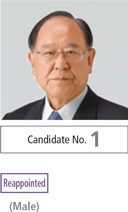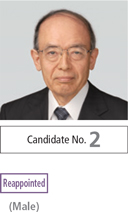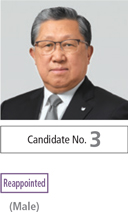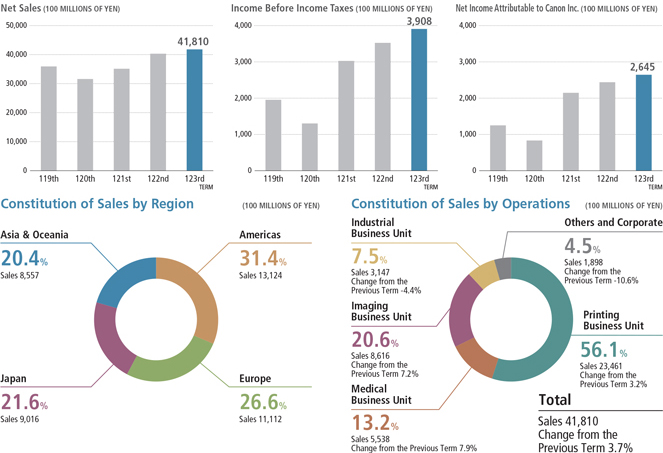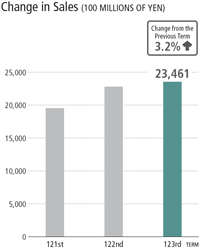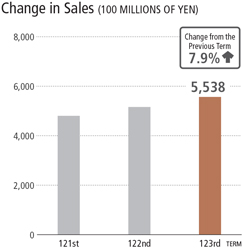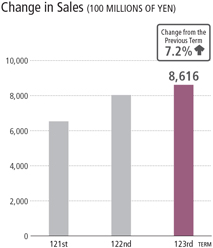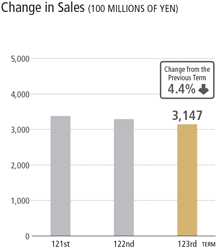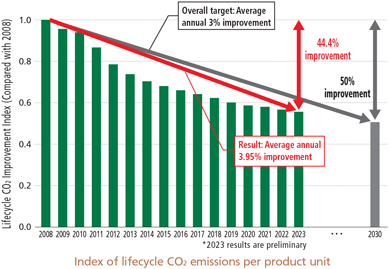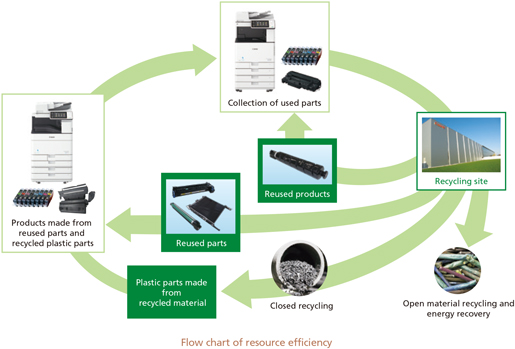REFERENCE
Sustainability Initiatives
Canon has been leading efforts to address environmental and social issues throughout the entire Group.
(1) Climate Change
Canon aims to achieve net zero CO2 emissions throughout the entire product life cycle by 2050. In 2023, GHG emissions reduction targets set by Canon Inc. were approved as science-based targets by the Science Based Targets initiative (SBTi), an international initiative to encourage companies to set greenhouse gas (GHG) emissions reduction targets on the basis of climate science. In line with SBTi criteria, Canon aims to reduce its own GHG emissions (Scope 1(*1), 2(*2)) by 42% in 2030 compared to 2022 levels, and to reduce emissions from the purchased goods and services and use of sold products (Scope 3(*3): Category 1, 11) by 25%, by reducing resources during development through the use of simulations without actual production, making products more compact and lighter, reducing power consumption, improving logistics efficiency, reducing power consumption in the production process, introducing renewable energy, and recycling products. Scope 1 and 2 were reduced by approximately 3.6%(*4) and Scope 3 was reduced by approximately 16%(*4) in 2023 compared to 2022. In addition, having set a group-wide environment target of achieving an average annual improvement of 3% in the index of lifecycle CO2 emissions per product unit, Canon has attained improvement of 44.4%(*5) (average annual improvement rate of 3.95%(*5)) as of 2023 compared with 2008. Canon discloses GHG emissions data which is covered by a third-party guarantee every year. Canon accepts the recommendations of the final report of the Task Force on Climate-related Financial Disclosures (TCFD). Based on these recommendations, Canon discloses key information related to climate change through its sustainability report and website. As a result of these initiatives, Canon was recognized by U.K.-based non-profit organization CDP in fiscal 2023 and was given an A score, which is the highest rating, in the field of climate change.
*1 Direct emissions produced by a business (fuel combustion, manufacturing processes, etc.)
*2 Indirect emissions arising from the use of electricity, heat, steam, etc. supplied by other companies
*3 Indirect emissions aside from those in Scope 1 and 2 (emissions from other companies associated with the business’s activities)
*4 Preliminary figures (including estimates)
*5 Preliminary figures (as of January 31, 2024)
(2) Resource Efficiency
In 1990, Canon launched its Toner Cartridge Recycling Program, the first such program in the industry. Canon pursues resource efficiency, thereby creating a circular recycling process. It has emphasized such initiatives as closed-loop recycling of toner cartridges and the remanufacturing of office multifunction devices, collecting them post-use and making them into products with good-as-new quality. In addition, Canon collects and refills used toner bottles and sells them in the European market. Currently, Canon has five sites conducting recycling, in Japan, the United States, Germany, France and China, and promotes initiatives aimed at circulating resources within the same regions where they are consumed. In 2023, Canon’s digital printing business, which handles MFDs and inkjet printers, set targets for the resource recycling ratio, which expresses the percentage of recycled materials and recycled products in the sales gross weight, aiming for 20% in 2025 and 50% in 2030.
Furthermore, as a Group-wide effort, Canon has been reducing materials for product packaging and eliminating polystyrene foam and switching to pulp mold to reduce the amount of single-use plastics, which face growing calls for elimination globally. In addition, Canon promotes reduction, reuse and recycling with respect to plastic waste generated at operational sites. The PowerShot V10, a vlog camera launched in 2023, has mostly eliminated single-use plastic for its cushioning and packaging materials.
(3) Respecting Human Rights
Recently, progress is being made on new legislation regarding investigations and disclosures concerning human rights, particularly in the United States and European nations. Respect for human rights is increasingly being considered a requirement for doing business. In accordance with this trend, Canon is strengthening such efforts. Specifically, the Canon Group has established the Canon Group Human Rights Policy, which expresses the Group’s commitment to respect and protect human rights. Based on the policy, it has enhanced its human-right initiatives, such as conducting human rights due diligence to identify human rights risks within Canon, instituting and operating a grievance mechanism for human rights infringement, conducting human rights awareness training through e-learning and other methods, engaging in dialogue with stakeholders, and visiting business partners to confirm their human rights situations firsthand. In 2023, Canon’s initiatives for human rights due diligence were featured on the websites of the International Labour Organization (ILO) and the Japan External Trade Organization (JETRO). Canon is advancing awareness and educational efforts by expanding the scope of its e-learning to overseas Group companies. Moreover, as a participant in The Responsible Business Alliance (RBA), a corporate alliance that promotes social responsibility in global supply chains, Canon is committed to identifying and reducing risks within the supply chain.
Going forward, Canon will continue to facilitate solutions to social challenges by actively helping achieve a sustainable society through all of its corporate activities.













